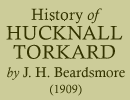< Previous | Contents | Next >
RELIGIOUS GROWTH.
We have seen that in the year 1659 a Nonconformist minister preached at the church, but not until the latter half of the 18th century is there definite evidence of any body of Christians other than churchpeople having church or chapel in the parish.
Mr. G. Pickup, who was born at Rushton, in Lancashire, in 1738, was brought up as a linen weaver, and when a young man he settled for a brief season at Cudworth, near Barnsley. He there fell in with some Methodists, became converted, and induced his relative, Timothy Hargreave (who was landlord of the public-house where he lodged) to join the Methodists. Timothy attended service on Sunday, and on Monday morning took a saw, cut down the sign-post, and stopped ale-selling.
George Pickup afterwards came to Hucknall to see his brother (an old soldier), who lay at the point of death. After his brother's death George decided to settle at Hucknall and carry on his brother's business of stocking-weaving. An old Methodist magazine says: —
"Here he found himself in a Sodom, for though a large village, not to say ten, scarcely one could be found in it that either feared God or regarded man."
There was no Methodist Society nearer than Nottingham, and thither George walked every Sabbath for worship. There were then only two local preachers at Nottingham, and George induced them to preach occasionally at his house. This event caused a stir among the villagers, some of whom, of the evil sort, made a practice of assailing the Methodists with mud and stones.
Gradually a small Society was formed, but of its career up to the close of the 18th century nothing more can be learned.
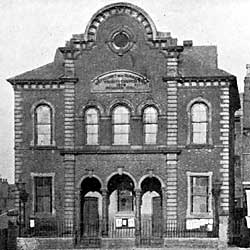
Trinity church.
In 1797 came the cleavage among the Wesleyan Methodists, which resulted in the formation of the Methodist New Connexion. In that year the Hucknall Methodists sought the advice of Mr. Huddlestone, of Arnold. He asked them whether they
would have Wesleyan or New Connexion preachers, and they replied:—"We will receive you and all others you think proper to recommend." Thus was the Methodist New Connexion Society introduced.
George Pickup's house in Belle Isle had become too small to hold the worshippers, so a barn built on the roadside waste on Annesley-road was rented and afterwards furnished with pulpit and forms. The place was broken into one night, the forms taken out and smashed by village rowdies.
The New Methodists, nothing daunted, secured a licence for the barn, furnished it with a gallery, and started a Sunday School in the year 1808.
In 1828 the chapel was enlarged and improved. Mr. Howitt, a Papplewick farmer (father of Mrs. Ruth Jackson) gave £200 to the building fund, and the story of how these early Methodists themselves got and dragged stone from Birk's quarry near Bulwell Wood Hall to the chapel is often told with pardonable pride.
On February 16th, 1817, George Pickup died, and was buried in the churchyard.
Hucknall has contributed four ministers to the Connexion, viz. the Revs. George Goodall, Wm. Brogdale, Henry Piggin, and C. D. Ward, D.D. George Goodall's ashes rest beneath a huge stone slab in the churchyard, on which is recorded his 42 years' service in the Methodist New Connexion ministry. He fell asleep on September 2nd, 1861, aged 65.
Mr. Brogdale went to the Newcastle-on-Tyne district, eventually leaving the ministry for the drapery trade. His new venture was a success, arid his wordly wealth was further increased by marriage with a well-to-do lady. In the seventies the old gentleman, having given up business, came to reside at Nottingham, and gave the old Hucknallites a tea annually in the National School until his death.
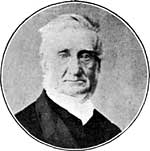
Mr. John Piggin.
The Rev. Henry Piggin belonged to the family which has done so much for the New Methodist cause that for years the meeting place was called "Piggins' Chapel." Henry was elected President of the Conference in 1875.
The Rev. C. D. Ward was another good and talented man; he was chosen President of the Connexion in 1876, and in that same year was granted the honorary degree of D.D. from an American University.
Among the more prominent members of the Society in the 19th century were Messrs. John Piggin (60 years Sunday School superintendent), William Thompson, William Rhodes, William Cale, James Piggin, Thomas Wilmott, Joseph Howitt, Robert Mellors, and Andrew Radford.
One feature of the first fifty years' existence of the Society was the attention given to the teaching of reading, writing, and arithmetic, on Sundays and on Monday nights. The teachers best remembered by men now grown old were Messrs. Heritage, W. Rhodes, F. J. Phelps, H. A. Ward, and Andrew Radford.
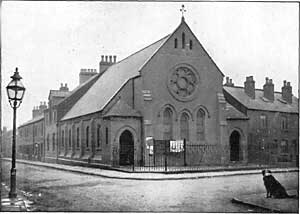
Bethseda chapel.
Many have gratefully acknowledged their indebtedness to their old voluntary teachers for instruction in the rudiments of knowledge at the Methodist Chapel.
In 1873 the Trinity Church in Baker-street was opened for worship having been built at a cost of £2,500. The memorial stone was laid by the late Mr. S. Morley, M.P.
In 1903 a spacious and well-equipped Sunday School building, erected at a cost of £4,500 (inclusive of site and furniture), on a site at the rear of Trinity Church, was opened. The old chapel was subsequently sold for £500. In 1908 there were 515 Sunday scholars.
The following ministers have presided over the Hucknall Circuit since its formation:—1884, A. Leach; 1885, J. Robinson; 1889, W. Yeoman; 1893, J. Gibson; 1897, T. Scowby; 1901, W. E. Newsam; 1906, T. Scowby.
In 1872 it was resolved to open a Mission at Butler's Hill, and Messrs. F. Goodall, T. Hardy, T. Whitworth, J. Collins, W. Brown, and S. Mills were appointed to pioneer the work there. The mission prospered. Bethesda Chapel was built in 1875. The congregations grew, and an enlargement was made in 1899, when new schools were added. The total cost was £2,000, which was all paid by 1907.
In 1908 there were 109 members and probationers, and 275 Sunday scholars and teachers.
Reference to the musical, temperance, and friendly society activities of the Methodists will be found in the pages herein devoted to those subjects.
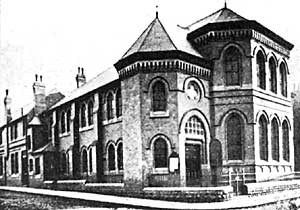
Primitive Methodist chapel and school.
The first mention of Hucknall Primitive Methodists occurs in the year 1816, six years after the body originated.
Cottage preaching signalised the first beginnings at Hucknall, at Mr. Smith's house in Wood Lane, and afterwards in the cottages tenanted by Messrs. George Oldham and Moss (now pulled down), opposite the Seven Stars Inn.
In 1839 the services were held in Wagstaffe's barn, latterly known as Bess Percy's. John Green was an ideal Sunday school superintendent at this place, which became crowded with scholars. A division occurred in 1840, when Mr. Wagstaffe favoured the Free Gospellers, and let them retain the barn, whilst the seven members who remained true to the Connexion were cast adrift, and these resorted to the Half Moon Club-room. This little body was subjected to petty persecution, and their small assembly was broken up.
In the following summer the Rev. E. Morton came from Arnold and missioned in the streets, and succeeded in re-establishing the little society, which for the seven years following met in Mr. Robert Hutchinson's cottage at the Towel Roller. The names of the seven who adhered to the Connexion were Mr. and Mrs. Robt. Hutchinson, William Allen, John Woollatt, T. Bramley, Mrs. Saxton, and Mrs. Mettam.
Preaching was carried on in a little hired room in the Lammas during the period 1848 to 1859, when the first Watnall-road chapel was built at a cost of £250; the opening preachers were Samuel Antcliffe, D.D., and C. H. Boden. In 1869 the chapel was enlarged, and ten years later vestries were added. About the year 1873 a branch chapel was built at Butler's Hill, and there were 55 members and 150 scholars connected with the Cavendish Street Chapel in 1907. This building cost £550.
In 1896 the old Watnall Road chapel was sold to the Church of Christ, and the new Watnall Road chapel and schools built at a cost of over £3,000.
The names of James Saxton and William Tongue deserve mention for their long continued service in the cause at Hucknall. Five Hucknall candidates have been received into the ministry, viz., Joseph Gothard, William Martin, Thos. Roberts, Thomas Hutchinson, and J. H. Saxton.
In 1901 Hucknall was created the centre of a new circuit, and the Rev. G. G. Martindale came here as the first resident Primitive Methodist minister. The Rev. G. T. Fawcett and Rev. J. W. Gregory succeeded Mr. Martindale in the superintendency of the Hucknall Circuit. There are now 150 members and 350 scholars associated with the Watnall Road chapel.
